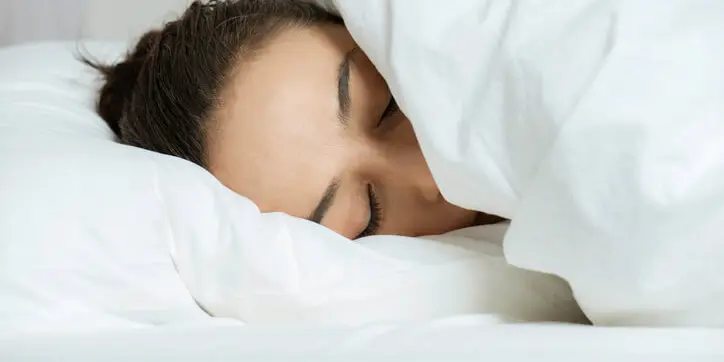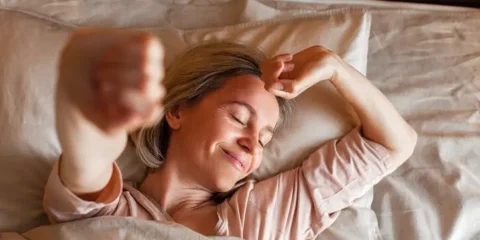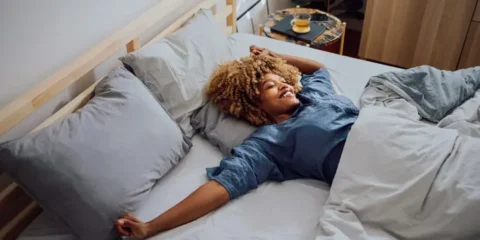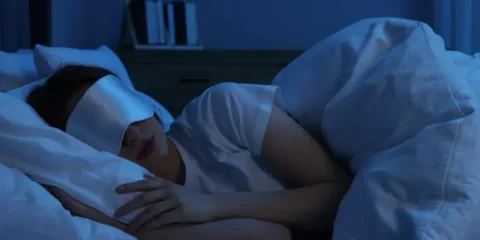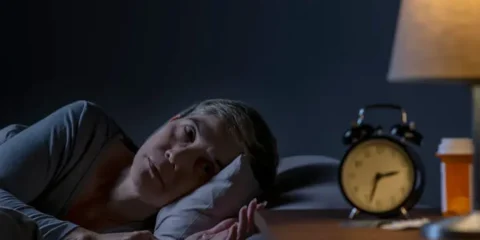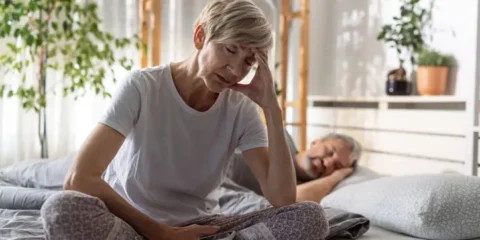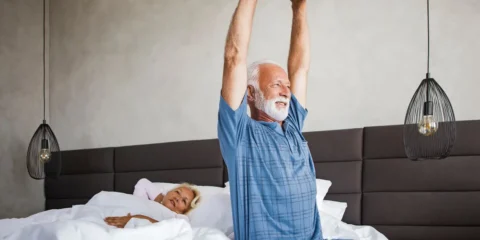Insomnia is no joke.
Night after night of lying awake, mind racing and muscles tense, watching the minutes tick by on the bedside clock. Feeling exhausted upon waking after finally drifting off just before sunrise. Relying on coffee and energy drinks to drag yourself through the day in a mental fog. Dreading going to bed again, knowing you’ll likely face yet another sleepless night.
You’ve tried all the “natural” sleep aids. Warm milk. Valerian root. Magnesium supplements. Melatonin. While some provide modest benefits, nothing seems to consistently deliver sound slumber when you need it most.
Trazodone has been used since the 1960s as a sleep aid. While not technically FDA approved for insomnia, it has over 50 years of clinical experience demonstrating its safety and efficacy for improving sleep quality.
In this blog, we’ll explore frequently asked questions about using trazodone for sleep disorders so you can determine if it may be right for you.
What is Trazodone and How Does it Work?
Trazodone belongs to a class of medications known as SARIs (serotonin antagonist and reuptake inhibitors). It works by blocking specific serotonin receptors in the brain, dampening overactive neural activity that can interfere with sleep onset and continuity.
Trazodone lightly sedates the nervous system, allowing the mind and body to relax into slumber rather than remaining tense or agitated.
Does Trazodone Improve Overall Quality of Sleep
Yes, trazodone has been shown in clinical studies to enhance overall sleep quality, not just simply sedation. It increases crucial deep restorative slow-wave sleep stages. Patients report feeling more refreshed upon waking, even after taking it long term.
Trazodone does not seem to negatively impact normal sleep architecture over time.
What Are the Benefits of Using Trazodone for Sleep Disorders?
Several advantages make trazodone one of the most commonly prescribed medications for insomnia:
Improves Sleep Onset and Duration
Multiple studies confirm trazodone decreases the time it takes to fall asleep and increases total sleep time. Subjects report improved sleep quality and fewer nighttime awakenings.
Effective for Insomnia
In clinical trials, trazodone significantly improved symptoms of insomnia like difficulty falling asleep and staying asleep vs a placebo. It demonstrated sustained efficacy with nightly use.
Well-Tolerated
Trazodone has a relatively favorable side effect profile, especially at the lower doses used for sleep disorders. The sedation wears off by morning for most people.
Safer than Benzodiazepines
It has a lower risk of dependency than benzodiazepines like Xanax and Ativan often prescribed for insomnia. Trazodone is less prone to tolerance and misuse.
Fewer Side Effects than OTC Sleep Aids
Common over-the-counter sleep medications like diphenhydramine and doxylamine produce more next-day sedation compared to low-dose trazodone.
While not a perfect solution, trazodone can provide relief for many people struggling with disrupted sleep. However, as with any medication, there are some potential risks and downsides to consider.
What is the Optimal Trazodone Dosage for Insomnia?

Doctors work closely with patients to determine the optimal individual effective dose based on factors like age, weight, and response to treatment.
What Are the Potential Side Effects and Risks?
The most common trazodone side effects include:
- Daytime drowsiness – Up to 20% of users experience residual sedation the next day. This is why it’s often taken a few hours before bedtime.
- Headaches – Can occur in up to 26% of people taking trazodone.
- Dizziness – Trazodone may lower blood pressure, causing temporary lightheadedness.
- Nausea, vomiting, diarrhea – Stomach upset occurs in about 12% of users. Taking trazodone with food can reduce gastrointestinal irritation.
- Dry mouth – A common anticholinergic side effect that can increase with larger doses.
- Fatigue – Some users report next-day weariness, sluggishness, and low energy.
How Should Trazodone Be Taken for Best Results?
- Most people respond best when taking trazodone 30-60 minutes prior to lying down to sleep.
- This gives sufficient time for trazodone to enter the system and exert its sedating effects, making it easier to fall asleep once in bed.
- For some, taking it 1-2 hours before bedtime allows them to avoid any residual daytime drowsiness.
Is long-term usage of trazodone for sleep considered safe?
Yes,most experts confirm trazodone is safe for most people when used nightly under medical supervision, even for years.
There is no indication of impaired cognition, addiction potential, or increased mortality rates. Periodic evaluations allow providers to ensure appropriate therapeutic dosing over time for each individual patient.
Can trazodone be utilized to treat REM sleep disorder specifically?
Trazodone is particularly effective for regulating REM (rapid eye movement) sleep disorder. In REM disorder, normal paralysis during dream sleep states is disrupted.
Trazodone suppresses REM sleep drive, minimizing associated nightmares, movement, and other disruptive symptoms.
If problematic REM sleep issues are significantly impacting restfulness, trazodone may help restore normal functioning.
Can trazodone usage lead to worse insomnia over time?
Fortunately, studies demonstrate trazodone maintains consistent efficacy over months and years of nightly use without worsening insomnia. There is no evidence of tolerance developing when used continuously under medical guidance at therapeutic doses. Patients do not require ever-increasing doses to achieve stable benefits.
Can trazodone be used as a dual treatment for both anxiety and insomnia?
Absolutely. Trazodone calms anxiety while facilitating sleep, making it very useful for anxious individuals with co-occurring insomnia.
Its anxiolytic effects often provide additional sleep benefits beyond the sedative properties. We frequently utilize trazodone for patients with anxiety disorders who require both anti-anxiety and sleep-promoting effects in one convenient capsule.
Combining NightLase® and Trazodone for Sleep Disorders
NightLase® therapy is offered by Allure Medical.
NightLase® is a non-invasive laser therapy that can reduce snoring and sleep apnea. It works by applying heat to the tissues of the airway, causing tightening that helps keep the airway open during sleep.
Studies have shown NightLase® can reduce snoring frequency and volume after just 1-3 treatment sessions. It is done in-office and takes only about 15 minutes per session.
Using NightLase® and trazodone together can provide a comprehensive approach to managing sleep disorders. NightLase® helps physically open the airway to reduce breathing disturbances, while trazodone calms the mind and body to initiate and maintain sleep.
This dual treatment approach can significantly improve symptoms of snoring, sleep apnea, and insomnia in many patients.
How Allure Medical Can Help You
If you remain frustrated by restless nights, we encourage you to book an appointment with Allure Medical to determine if trazodone could help you finally get the deep, restorative slumber your mind and body crave.
Our caring medical staff is dedicated to helping you identify the optimal solutions so you can feel refreshed and energized every morning.

